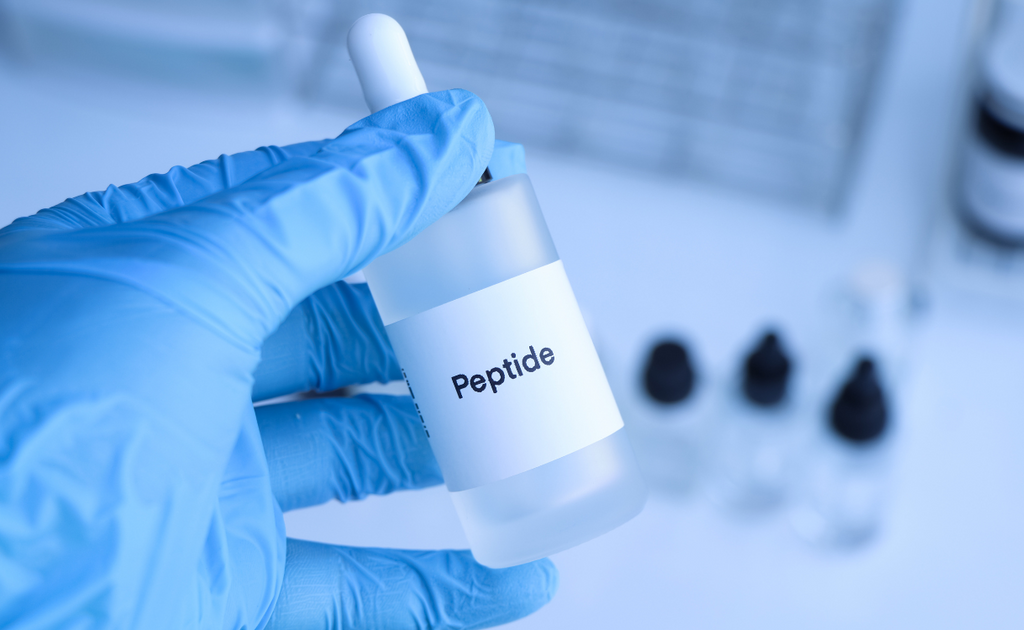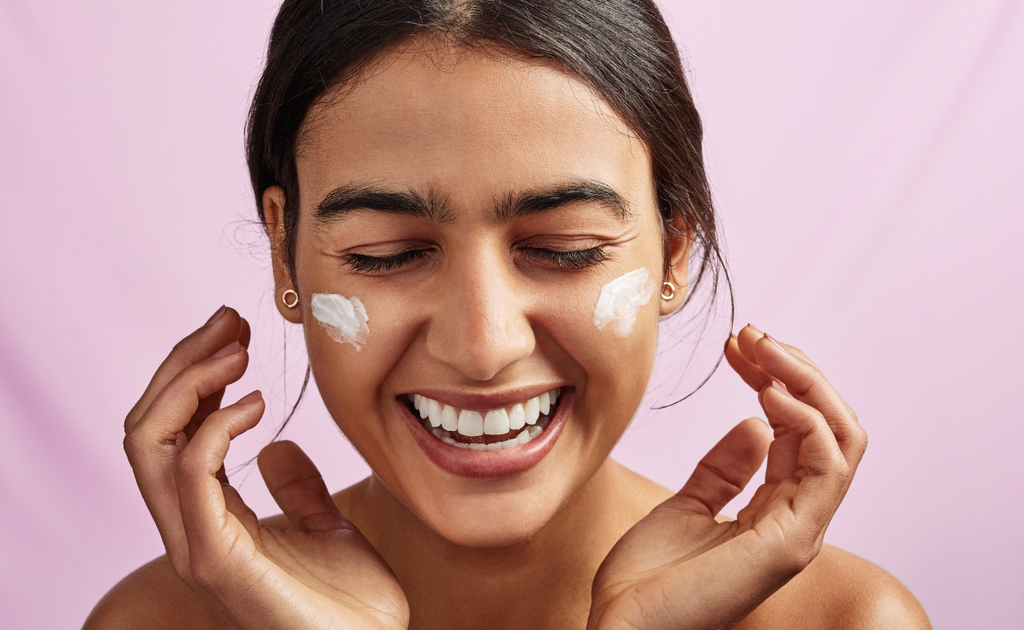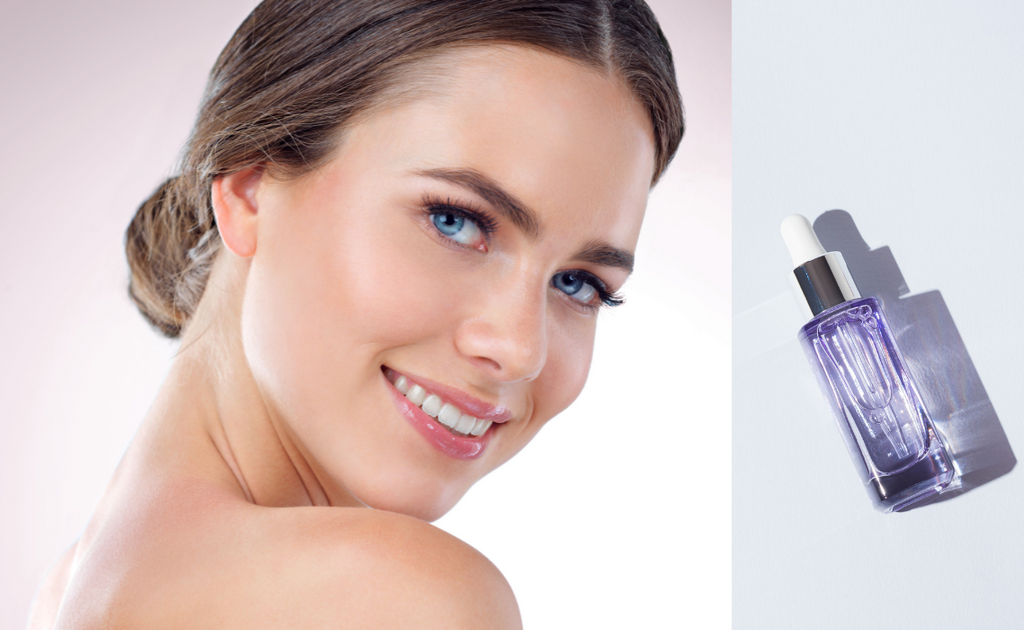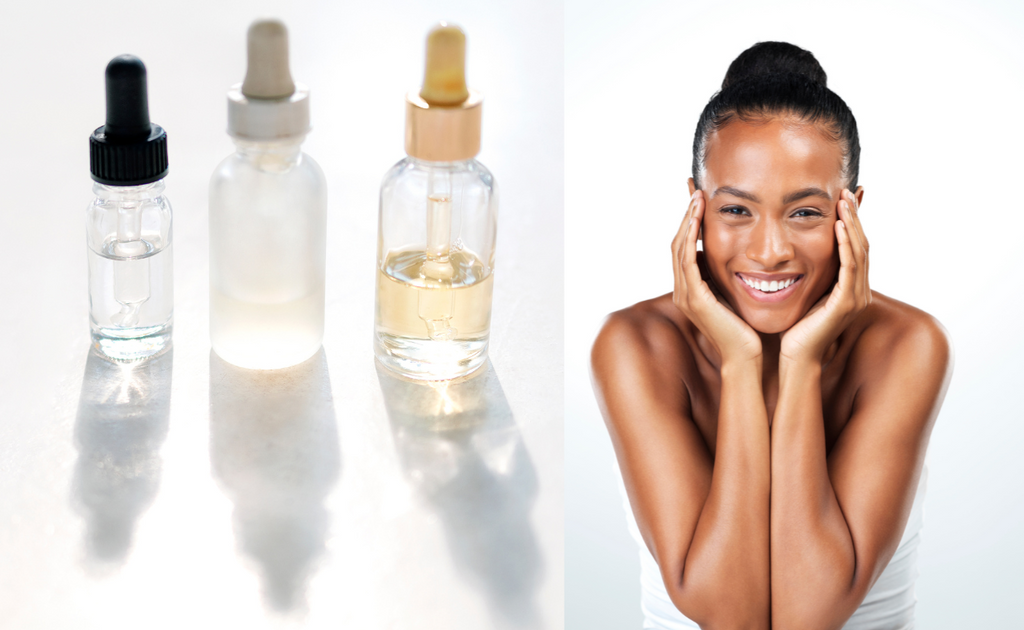Peptides 101 - The Ultimate Guide to Understanding and Using Them in Your Skincare Routine
 The Power of Peptides in Skincare
The Power of Peptides in Skincare
Peptides, which are small chains of amino acids, have become notable for their role in promoting skin health and rejuvenation. As the building blocks of proteins such as collagen, elastin and keratin, peptides are essential for maintaining the skin’s firmness, elasticity and strength.
In skincare, they are often used for their ability to signal the skin to produce more collagen, thus reducing the appearance of fine lines and wrinkles, improving texture and enhancing overall skin tone.
Peptides exert their transformative effects on skin health by acting as messengers that stimulate the skin cells to perform specific functions. On a cellular level, when peptides are applied to the skin, they mimic the appearance of broken-down collagen, causing the skin to “think” collagen is deteriorating and it must generate new collagen for repair.
Furthermore, some peptides may also block the transmission of signals that cause muscle contractions, which can lead to a reduction in the formation of dynamic wrinkles.
This signalling mechanism not only promotes skin healing and renewal but also triggers the production of other essential proteins such as elastin, which confers skin with its elastic quality, and fibronectin, which supports tissue repair and cell growth.
 Peptides short chains of amino acids that support skin barrier.
Peptides short chains of amino acids that support skin barrier.
What Are Peptides?
Peptides are essentially short chains of amino acids, the fundamental building blocks of proteins.
Linked together by peptide bonds, they are formed when the carboxyl group of one amino acid reacts with the amino group of another, releasing a molecule of water in a process known as a condensation reaction. In essence, peptides are smaller versions of proteins, often referred to as mini-proteins. However, unlike proteins, which can be made up of 50 or more amino acids, peptides typically contain between 2 to 50 amino acids.
This smaller size allows for easier skin penetration when applied within skincare formulations, where they can efficiently carry out their role as signaling molecules and prompt the skin's own processes to accelerate repair and regeneration.

Types of Peptides Commonly Used in Skincare Products
In the realm of skincare, peptides are categorized based on their structure and function. Some of the most commonly utilized peptides include:
- Signal Peptides: These peptides promote collagen, elastin, and other protein production, providing anti-aging benefits and improving skin firmness.
- Carrier Peptides: They deliver trace elements such as copper and magnesium to the skin, aiding in wound healing and enzymatic functions.
- Enzyme Inhibitor Peptides: These peptides block the enzymes that break down collagen and elastin in the skin, helping to slow down the aging process.
- Neurotransmitter Peptides: Often compared to Botox, these peptides help in reducing expression lines by limiting neurotransmitter release. example:
- Growth Factor Peptides: These peptides help in cell growth and differentiation, promoting skin repair and rejuvenation.
You may see anti-aging formulas paired with vitamin C and hyaluronic acid.
Natural vs Synthetic Peptides
Plant peptides vs synthetic peptides: Plant-derived peptides, such as from green tea or soy, can offer additional benefits like antioxidant protection and soothing properties.
Natural peptides
Natural peptides, which are found abundantly in various plants and biological systems, have been harnessed in skincare due to their beneficial properties. Here are five examples:
- Soy peptides: Derived from soybeans, these peptides are known for their skin-smoothing and antioxidant properties, helping to improve skin tone and texture.
- Silk peptides: Sourced from the cocoon of the silk worm, these peptides can aid in moisture retention, resulting in a softer and plumper skin appearance.
- Pea peptides: Extracted from Pisum sativum, or the common garden pea, these peptides help to firm the skin and have shown promise in reducing the signs of aging.
- Rice peptides: Obtained from rice proteins, these peptides are rich in amino acids and are recognized for their skin-conditioning and protecting capabilities.
- Wheat peptides: These peptides, derived from wheat proteins, offer benefits such as increased skin firmness and reduced appearance of fine lines by promoting the skin's production of collagen and elastin.
 Synthetic peptides
Synthetic peptides
Synthetic peptides are created in a lab and may have more targeted effects on specific skin concerns.
In the realm of synthetic peptides, scientists have engineered various types to address an array of skin concerns. These engineered peptides are designed to mimic natural processes or to create specific reactions within the skin. Here are ten examples of synthetic peptides used in the skincare industry:
- Palmitoyl Pentapeptide-4 (Matrixyl): This is a classic anti-aging ingredient that stimulates collagen production and reduces the appearance of fine lines and wrinkles.
- Acetyl Hexapeptide-8 (Argireline): Often referred to as 'Botox in a jar’, it helps reduce the intensity of muscle contractions to prevent the formation of expression lines.
- Palmitoyl Tripeptide-1: This peptide can promote skin firmness and elasticity and is often used in conjunction with other peptides for comprehensive anti-aging effects.
- Palmitoyl Tetrapeptide-7: Known to have anti-inflammatory properties, this peptide can help reduce skin inflammation and the subsequent breakdown of collagen and elastin.
- Hexapeptide-9: It’s known for its ability to promote wound healing and skin regeneration by stimulating collagen synthesis.
- Dipeptide Diaminobutyroyl Benzylamide Diacetate: This peptide mimics the effects of a compound found in snake venom, temporarily relaxing facial muscles to smooth out wrinkles.
- Myristoyl Pentapeptide-17: Often found in eyelash growth serums, this peptide encourages hair follicle growth and fortification.
- Myristoyl Hexapeptide-16: Similar to Pentapeptide-17, it’s also used for enhancing eyelash and eyebrow hair growth for a fuller look.
- Caprooyl Tetrapeptide-3 (ChroNoline): This peptide is known to boost key components of the skin's structure, such as laminin and fibronectin, for improved dermal-epidermal junction integrity.
- Tripeptide-29: This synthetic peptide is specifically designed to increase collagen production and improve the hydration and overall texture of the skin.
Each of these synthetic peptides is designed to target specific skin issues, from anti-aging to promoting hair growth, offering potent benefits in precision skincare formulations.

The Benefits of Peptides for Skin
Peptides are celebrated for their anti-aging effects, primarily due to their ability to signal the skin to amp up its collagen production, countering the natural decline that occurs with age. This process is instrumental in decreasing the appearance of fine lines and wrinkles, giving the skin a more youthful and plump look.
The replenished collagen density not only reduces existing signs of aging but also strengthens the skin's barrier, mitigating further damage. Regular use of peptide-enriched skincare can thus have a pronounced effect on maintaining a smoother and firmer skin texture over time.
Skin Repair and Regeneration: Enhancing the Skin’s Natural Healing Processes
Skin repair and regeneration are critical processes that maintain the skin's integrity and youthful appearance. Peptides contribute significantly to these processes by encouraging the production of the skin’s natural proteins.
When the skin suffers damage from environmental factors like UV radiation or pollution, peptides act as a signal to initiate repair mechanisms. These include the acceleration of cell turnover, which replaces damaged cells with new ones, and the strengthening of the skin’s protective barrier to defend against further assault. Moreover, by bolstering the synthesis of hyaluronic acid, peptides help maintain moisture levels, preventing dryness and facilitating healing.
Consequently, skin resilience is enhanced, and its ability to heal from injury is noticeably improved with the use of peptide-infused skincare products.
Antimicrobial peptides , in particular, have been studied for their ability to combat harmful bacteria on the skin's surface. This makes peptides a valuable ingredient for those struggling with acne-prone or sensitive skin. With consistent use, these peptides can help reduce the occurrence of breakouts and promote a clearer complexion.

Hydration: Helping to Maintain Skin Moisture Levels
Peptide application in skincare serves not only as a stimulant for collagen production but also plays a pivotal role in skin hydration. By signaling for increased synthesis of hyaluronic acid — a natural humectant capable of holding up to 1000 times its weight in water — peptides aid in maintaining optimal moisture levels within the skin.
This enhanced hydration leads to visibly plumper skin with a reduction in the appearance of fine lines often exacerbated by dryness. Furthermore, a well-hydrated skin barrier is more resilient against environmental stressors and can more effectively regulate lipid content, ensuring a balanced complexion with a healthy, dewy glow.
How Peptides Work in Skincare
Mechanism of Skin Penetration by PeptidesPeptides' skin penetration ability is a key factor in their efficacy in skincare. The molecular structure of peptides allows them to be small and versatile enough to penetrate the skin's outer layer, the stratum corneum.
This is where their size plays a critical role; due to their relatively low molecular weight in comparison to proteins, peptides can more easily navigate through the skin's lipid barriers.
Upon application, skincare formulations facilitate their delivery; encapsulation methods such as liposomes or nanospheres can further enhance this penetration by protecting the peptide and delivering it deeper into the skin layers.
Once beneath the surface, peptides engage with receptors on the skin cells initiating the desired signaling pathways that lead to the synthesis of collagen, elastin, and other vital skin components, thus enabling their notable regenerative and reparative effects.

Stimulating Collagen Production: Peptides at Work
Collagen production stimulation by peptides occurs through a unique signaling process that tricks the skin into thinking it needs to produce more collagen.
As the skin ages, natural collagen synthesis declines, leading to visible signs of aging. When peptides penetrate the skin, they simulate the presence of broken-down collagen, essentially sending a false signal that the skin's collagen stores are depleting.
In response, skin cells kick into overdrive to produce more collagen. Additionally, some peptides have the ability to activate growth factors which further stimulate collagen production.
The net result is an increase in collagen synthesis, and as a consequence, the skin begins to appear firmer and smoother, with improved elasticity and a reduction in fine lines and wrinkles. This biomimetic approach is why peptides are a cornerstone ingredient in the quest for youthful, radiant skin.
Considerations for Different Skin Types and Concerns
When incorporating peptide-based skincare into your routine, it's essential to account for your specific skin type and concerns.
For oily or acne-prone skin, select non-comedogenic peptide products that offer oil-free hydration while avoiding heavy formulations that may clog pores.
For dry or sensitive skin, choose products with peptides that also contain nourishing ingredients to bolster the skin's moisture barrier and reduce irritation.
Mature skin will benefit from peptides that target elasticity and density, potentially in richer creams that support skin prone to dryness and loss of volume. It's also important for those with pigmentation issues to pair peptides with ingredients known for their brightening properties to even out skin tone.
For all skin types, but especially reactive or allergy-prone skin, patch testing a new product is crucial to ensure compatibility and prevent adverse reactions.
Embrace the versatility of peptides while tailoring their use to your unique skin needs for the best results.

Importance of peptides in a skincare routine
Benefits of using peptides include younger looking skin, improved skin barrier and more elastic skin, some people also notice improved skin tone and fewer breakouts.
Copper peptides and collagen peptides are two popular types of peptides used in skincare. Copper peptides have antioxidant properties and can promote wound healing, while collagen peptides may improve skin elasticity and hydration.
Peptide injections, commonly known as Botox injections, are another way peptides can be used in skincare. They work by temporarily paralyzing facial muscles to reduce the appearance of wrinkles by limiting muscle contraction.
In summary, peptide-based skincare products have the ability to penetrate the skin's outer layer and stimulate collagen production, resulting in firmer, smoother, and more youthful-looking skin.
When selecting a peptide product, consider the variety and concentration of peptides, packaging, and other beneficial ingredients. Tailor your peptide use to your unique skin needs for the best results.
REFERENCES
Fields, K., Falla, T. J., Rodan, K., & Bush, L. (2009). Bioactive peptides: signaling the future. Journal of Cosmetic Dermatology, 8(1), 8–13. https://doi.org/10.1111/j.1473-2165.2009.00416.x
Gorouhi, F., & Maibach, H. I. (2009). Role of topical peptides in preventing or treating aged skin. International Journal of Cosmetic Science, 31(5), 327–345. https://doi.org/10.1111/j.1468-2494.2009.00490.x
Schagen, S. K. (2017). Topical Peptide Treatments with Effective Anti-Aging Results. Cosmetics, 4(2), 16. https://doi.org/10.3390/cosmetics4020016
Varani, J., Dame, M. K., Rittie, L., Fligiel, S. E., Kang, S., Fisher, G. J., & Voorhees, J. J. (2006). Decreased Collagen Production in Chronologically Aged Skin: Roles of Age-Dependent Alteration in Fibroblast Function and Defective Mechanical Stimulation. The American Journal of Pathology, 168(6), 1861–1868. https://doi.org/10.2353/ajpath.2006.051302
Haseeb Ahsan Immunopharmacology and immunopathology of peptides and proteins in personal products https://pubmed.ncbi.nlm.nih.gov/31204576/
https://pubmed.ncbi.nlm.nih.gov/31204576/

